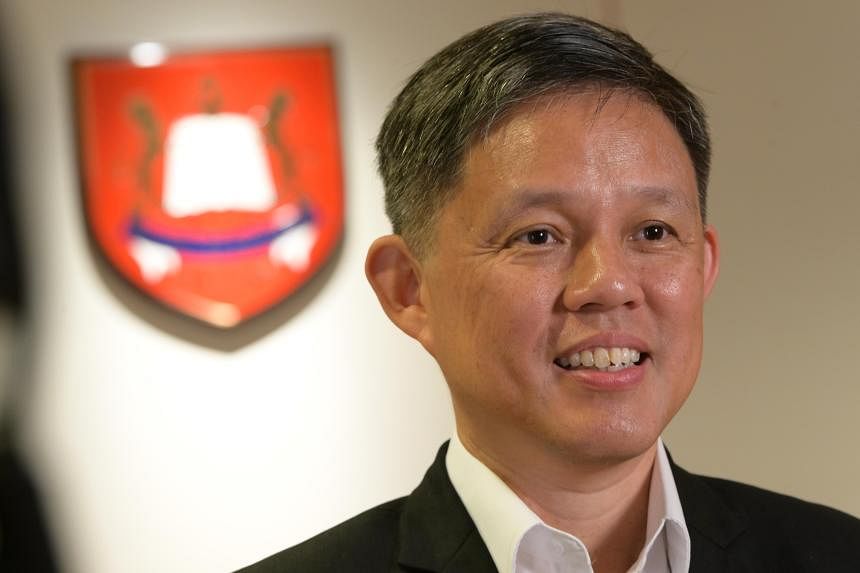SINGAPORE – Many Singapore parents today are highly educated and more involved in their children’s lives than ever, and this is natural, said Education Minister Chan Chun Sing.
But they need to find a delicate balance between being overly controlling and being completely hands-off, he said in a sit-down interview with The Straits Times on Dec 27, ahead of the new school year.
His hope is that parents can work together with teachers to give children the space to grow and the chance to be independent.
“Just because you have a master’s and PhD doesn’t mean that you are a better teacher... Teaching is an art and science. It’s not (about) your academic qualification,” he said.
He added that attracting good-quality individuals to join the teaching profession is important, noting that some education systems have, over the years, declined in performance because they cannot draw competent teachers.
During the two-hour session, Mr Chan spoke on a range of issues, from the challenges and benefits of full subject-based banding in schools to the key priorities he has set out for the education system in 2024. These include investing more in learning for adults and uplifting teacher training for those in the special education sector.
In his more than two years as education minister since May 2021, Mr Chan has seen his fair share of entitled parents.
These range from those who demand a re-scoring of their children’s Primary School Leaving Examination (PSLE) papers to one who wrote to him about her child’s missing water bottle.
He once asked a group of parents who came to him about their children’s PSLE scores: “Do your children know that you’re coming to see the minister over their scores?”
Said Mr Chan: “If I’m the kid and I know my parents are doing this for me, what kind of value system do you think I will grow up with?”
Parents should not feel guilty about not doing enough, he added.
“Already, Singaporean parents are generally really quite on the ball. If you guilt-trip them, you make them go overboard. So I think we are now at a stage where we are finding that equilibrium, because parents can contribute a lot to the schools and the upbringing of the kid,” he said.
He also gave some remarks on the recent Programme for International Student Assessment findings, which showed that only about half of Singapore’s students said their parents took an interest at least once a week in what they were learning, among other things.
“I’m not particularly fussed, because it all depends on how you interpret it,” said Mr Chan, adding that such figures may not be as meaningful as they are averages.
“But there is a sweet spot (in terms of parental involvement) for your own child at different stages in life. For 15-year-olds… they need to have some space.”
“We are also maturing in our parenting style, whether it’s with our first, second or third child,” he added.
The partnership between parents and teachers is important, he said. “Otherwise, whatever we do in school is undone by the time they are outside school.”
Having said that, there are many positive examples of parents who are active in schools’ parent support groups. Some of them conduct career talks or organise school activities or camps, which helps alleviate some of the teachers’ load, he said.
“It boils down to respect for the teaching profession,” he said. “We are in a more privileged position now, but we’re not complacent. This is something that I will always safeguard – that teachers are not disrespected.
“If a child sees their parents making demands on their teachers in a very unprofessional, unfair or unethical way, then I think we are transmitting the wrong values.”
Mr Chan said the demands of teaching have become more complex in recent years.
“It’s not that we’re teaching more things or teaching things at a higher level, but a lot of this ‘heart’ work is emotionally draining. To be fair, it saps your energy only if you care, and our teachers care,” he added.
The full subject-based banding approach, which has been gradually rolled out in secondary schools and will be fully implemented in 2024, has presented schools with timetabling challenges, he acknowledged.
Under this system, students can take subjects at different levels based on their abilities and strengths rather than be confined to a single academic stream. They will also be placed in mixed form classes, where students come from different academic levels.
It takes more resources to plan mixed form classes, said Mr Chan.
“You may have gaps in the timetable, which means that you can look at it negatively or positively. You can look at it positively and say that it’s also like the junior college system, (and there’s) a chance for you to do more self-directed learning and self-management rather than (being) spoon-fed period after period,” he said.
The hope is that this shift to full subject-based banding will boost students’ confidence over time and help them not be pigeonholed into certain academic streams, he said.
“I don’t want to have this binary divide in society where some people think that ‘I can contribute’ or ‘I’m just a receiver’.”
Mr Chan said that by helping students to appreciate the diversity of gifts and talents that people have, they will learn something about respect, which is “more important than just social mixing”.
“I want every kid in every school to know that there is something in them that they can bring to the table,” he said.


